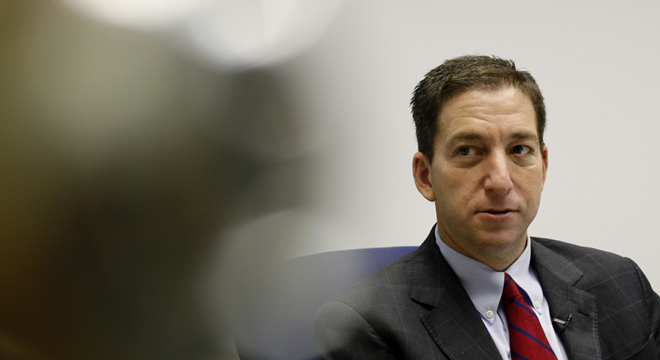RIO DE JANEIRO (AP) — The American journalist who has written stories based on documents leaked by former National Security Agency contractor Edward Snowden said Monday he’ll start publishing material with more frequency and fervor after his partner was detained for nine hours at Heathrow Airport.
London police detained David Miranda, the partner of reporter Glenn Greenwald, under anti-terror legislation at the London airport on Sunday. Miranda finally arrived Monday in Rio de Janeiro, where he lives with Greenwald.
A defiant Greenwald promised that he was going “to write much more aggressively than before” about government snooping.
“I’m going to publish many more things about England, as well,” he said in Portuguese at Rio’s international airport when Miranda arrived. “I have many documents about England’s espionage system, and now my focus will be there, too. I think they’ll regret what they’ve done.”
Miranda said he wasn’t threatened while detained at Heathrow, but confirmed that personal objects were taken from him.
“I stayed in a room, there were six different agents, entering and leaving, who spoke with me,” he said. “They asked questions about my whole life, about everything. They took my computer, video game, cellphone, memory thumb drives, everything.”
In London, a British lawmaker called for police to explain why Miranda had been detained and why it took nearly nine hours to question him.
Miranda was held for nearly the maximum time that British authorities are allowed to detain individuals under the Terrorism Act’s Schedule 7, which authorizes security agencies to stop and question people at borders.
“What needs to happen pretty rapidly is we need to establish the full facts,” Keith Vaz, chairman of Parliament’s Home Affairs Select Committee, told the BBC.
“Now you have a complaint from Mr. Greenwald and the Brazilian government — they indeed have said they are concerned at the use of terrorism legislation for something that does not appear to relate to terrorism. So it needs to be clarified, and clarified quickly.”
Vaz said it was “extraordinary” that police knew that Miranda was Greenwald’s partner and that the authorities were targeting partners of people involved in Snowden’s disclosures.
Britain’s laws are not unique. U.S. customs officials can search the electronic devices of anyone entering the U.S. without a search warrant. According to a 2011 internal Homeland Security Department report, officers at the border can search the devices and in some cases hold on to them for weeks or months. The DHS has said such searches help law enforcement detect child pornographers or terrorists.
Greenwald has written about NSA surveillance programs based on files disclosed by Snowden, who now has temporary asylum in Russia. The Obama administration wants Snowden sent back to the United States to be tried for the leaks.
Miranda, a 28-year-old university student, was stopped while traveling home to Brazil after visiting Germany, where he met with Laura Poitras, a U.S. filmmaker who has worked with Greenwald on the NSA story.
British police acknowledged that they had detained a 28-year-old man at 8:05 a.m. He was released at 5 p.m. without being arrested, the Metropolitan Police Service said. They have not commented further.
The Guardian newspaper reported it paid for Miranda’s flights but said that he was not an employee of the newspaper.
“As Glenn Greenwald’s partner, he often assists him in his work,” the newspaper said in statement. “We would normally reimburse the expenses of someone aiding a reporter in such circumstances.”
In an email Monday to The Associated Press, Greenwald said he needed material from Poitras for stories he was working on with her relating to the NSA, and that he had things that she needed.
“David, since he was in Berlin, helped with that exchange,” Greenwald wrote.
Greenwald didn’t say what material Miranda may have been carrying, but said only he and Poitras “have copies of the full archives of NSA documents which Snowden gave to journalists, so much of the speculation about what he was or wasn’t carrying is misinformed.”
The British Home Office did not comment on Miranda’s detention.
But it defended Schedule 7 in a report last year, arguing it was designed to help authorities determine whether people crossing U.K. borders have been involved in the “commission, preparation or instigation of acts of terrorism.” Border agents are not required to have reasonable suspicion before detaining a traveler.
David Anderson, Britain’s official independent reviewer of terrorism legislation, said he had asked authorities to explain why Miranda was detained and held for so long. He said fewer than 40 people out of 69,000 stopped under Schedule 7 in 2011-2012 were held for six hours or more.
In most cases, those questioned under Schedule 7 are detained for less than an hour.
“It is such a wide power that it would be surprising if it was used perfectly on every occasion,” Anderson told the BBC. “It is a very extensive power and this just points up the need to have it properly controlled.”
Isabella Sankey, policy director at the human rights organization Liberty, said the group had challenged Schedule 7 at the European Court of Human Rights. The British government is expected to submit submissions on the merits of the case in mid-September.
“This case very clearly highlights all the huge problems with this power,” she said. “Shocking that it is, we’re not surprised. We see this power used routinely. … It’s caused huge alienation.”
A spokesman for Prime Minister David Cameron said that “Schedule 7 forms an essential part of the U.K.’s border security arrangements,” but added that it was for the police to decide “when it is necessary and proportionate to use these powers.”
___
Kirka reported from London. Associated Press writer Alicia Caldwell contributed from Washington.
Copyright 2013 The Associated Press.






